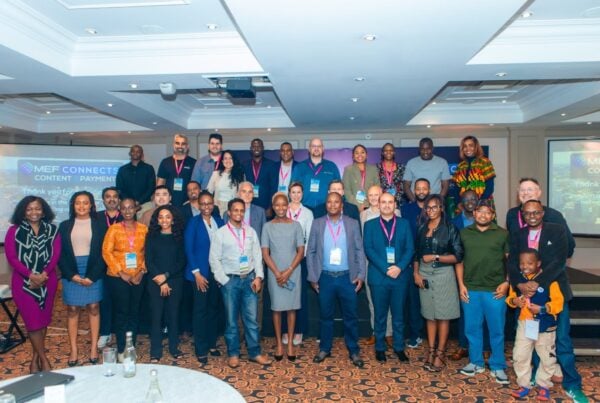Africa stands on the brink of a digital content revolution. A vast mobile-first audience is ready to embrace affordable streaming services in huge quantities. Well, that’s the theory. It is feasible? Last week’s MEF Connects Digital webinar, supported by Content Connect Africa, convened five insiders to find out…
There are two ways to look at the African digital content market.
The first focuses on a continent of rising economic wealth with a youthful mobile-first population hungry for entertainment.
The second points to 54 distinct markets with no history of paying for content and a lack of payment instruments to do so.
Obviously, both are right.
Watch the MEF Connects Digital panel in full
Which is why any discussion of the African digital content opportunity is a combination of genuine excitement and pragmatic caution.
The recent MEF webinar was no different.
The Future of Digital Entertainment in Africa saw a panel of insiders discuss business models, payment options, the role of operators, local content platforms, the prospects for global players and more.
The ringback tone phenomenon was unique to Africa. You had 80 to 90 percent of people phoning someone to hear a song. Now that’s slowing down a little. But it’s giving way to a hunger for short form comedy and lifestyle content.” – Antos Stella
The experts were:
- Antos Stella – CEO, Content Connect Africa
- Peter Verkade – CCO, Unitel
- Thabiet Allie – CCO of Music, Tencent Africa
- Ngozi Madueke-Dozie – General Manager, West Africa, iflix
- Stephen Watson – Managing Director, Discover Digital
Here are the key take-aways of their hour long discussion.
Ringback tones are the foundation for African digital content
“Ringback tones have been a catalyst for users to access the data market. Many users are afraid of the cost of data, but music has this emotional link so it’s given operators a way to interact with users – and move them on to other services like education and video.” – Thabiet Allie
“The ringback tone phenomenon was unique to Africa. You had 80 to 90 percent of people phoning someone to hear a song. Now that’s slowing down a little. But it’s giving way to a hunger for short form comedy and lifestyle content.” – Antos Stella
Africa is not one country: gospel and comedy are the only pan-African genres
“You have to make sure you don’t see Africa as one market. What works in South Africa won’t necessarily work in Uganda. The exception from what we’ve seen is gospel and comedy. Religion is religion, and there does seem to be a kind of comedy that works everywhere.” – Stephen Watson
“Local content will be the big differentiator in the future. As an operator it’s important to be involved not just in distribution but also get close to content production. We have a music streaming service that is a platform to local artists to launch their own albums.” – Peter Verkade
“Many people see Africa as one country and use a cookie cutter model. But what works exceptionally well is physically being on the ground in different territories. For example, Samsung launched a music service. It had the platform the partners, the access to information, but because the localisation didn’t take place, it didn’t succeed.” – Thabiet Allie
I can’t wait for Spotify to enter the market because they will make advertisers and brands think more about how to engage with fans through music. We should never forget that music is about an emotional connection.” – Thabiet Allie
Operators have a special role to play
“I do believe that operators have massive captive audiences and I see the big opportunity for them. They have been successful in some territories and created a very sustainable environments for independent artists. They deserve credit for that.” – Antos Stella
“We have worked with operators. It’s a no brainer. They have the infrastructure, the subscriber base, the marketing assets and payment channels. We launched in Nigeria in August and did quite well, but everything changed when we partnered with Glo.” – Ngozi Madueke-Dozie
… But operators need to share more revenue back
“In some markets operators are looking for 70 per cent. If you’re licensing content and trying to pay royalties of 55 to 75 per cent, that’s simply never going to work.” – Stephen Watson
“It’s a massive issue. They have not always been fair in their revenue split. I think the biggest problem is that they don’t always understand the content business. They have someone sitting somewhere trying to create it, and they just Google traditional music. That doesn’t work. They can’t own the content and the data. They have to share it. But they do need to be at the table.” – Antos Stella
Global giants will bring advertisers and brands with them
“I can’t wait for Spotify to enter the market because they will make advertisers and brands think more about how to engage with fans through music. We should never forget that music is about an emotional connection.” – Thabiet Allie
…But they won’t dominate
“Spotify is not here yet. iTunes is, but it’s really for the premium market. They all struggle to make their services affordable. People are hungry for content, but asking them to pay for data and then $20 or 30 a month on top doesn’t make sense. But when someone does get that streaming model right, it’s going to blow up.” – Antos Stella
Too much content is re-purposed
“A lot of content is not necessarily made for mobile. It’s old TV content for example, which is too long. We need short form for mobile. Then the price issue goes away.” – Peter Verkade
Carrier billing is fundamental
“If you look at Netflix, they have fewer than 200,000 subscribers across all of Africa. This shows that credit card payment simply doesn’t work. Carrier billing is fundamental, but operators have to align with PayPal and the rest and go down to five to ten percent.” – Stephen Watson
You have to disrupt the ‘propensity to pay’
“When you launch a commercial service, you have to make people prepared to pay, which can be difficult when they have little history of paying for content and a lack of payment options. We do not use credit cards, so paying with airtime has been fundamental for us. We have to be flexible so we charge less than $3, and we offer daily or weekly payment collection.” – Ngozi Madueke-Dozie
Subscribe to MEFTV
For more unique interviews, opinions, panels and webinars, subscribe to the MEFTV YouTube channel, and stay up to date with MEF Members and the global mobile ecosystem.






